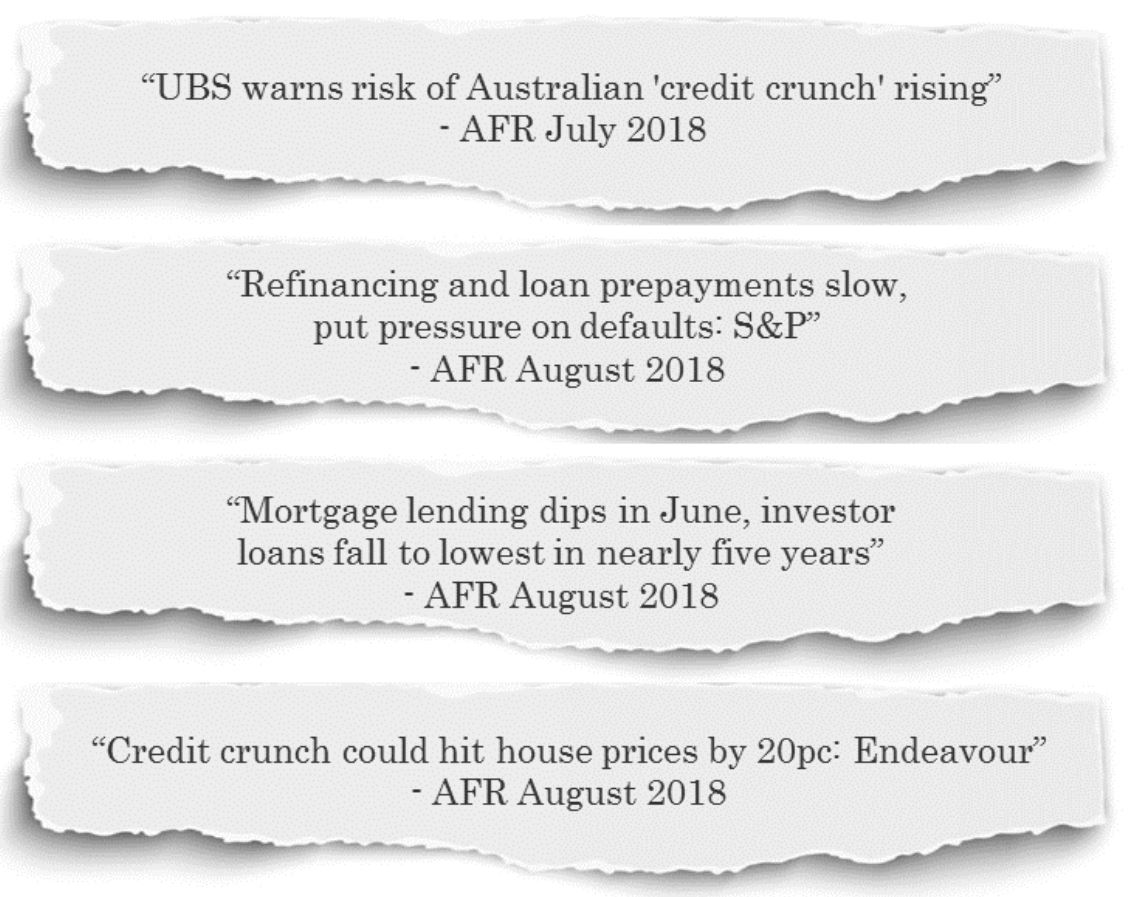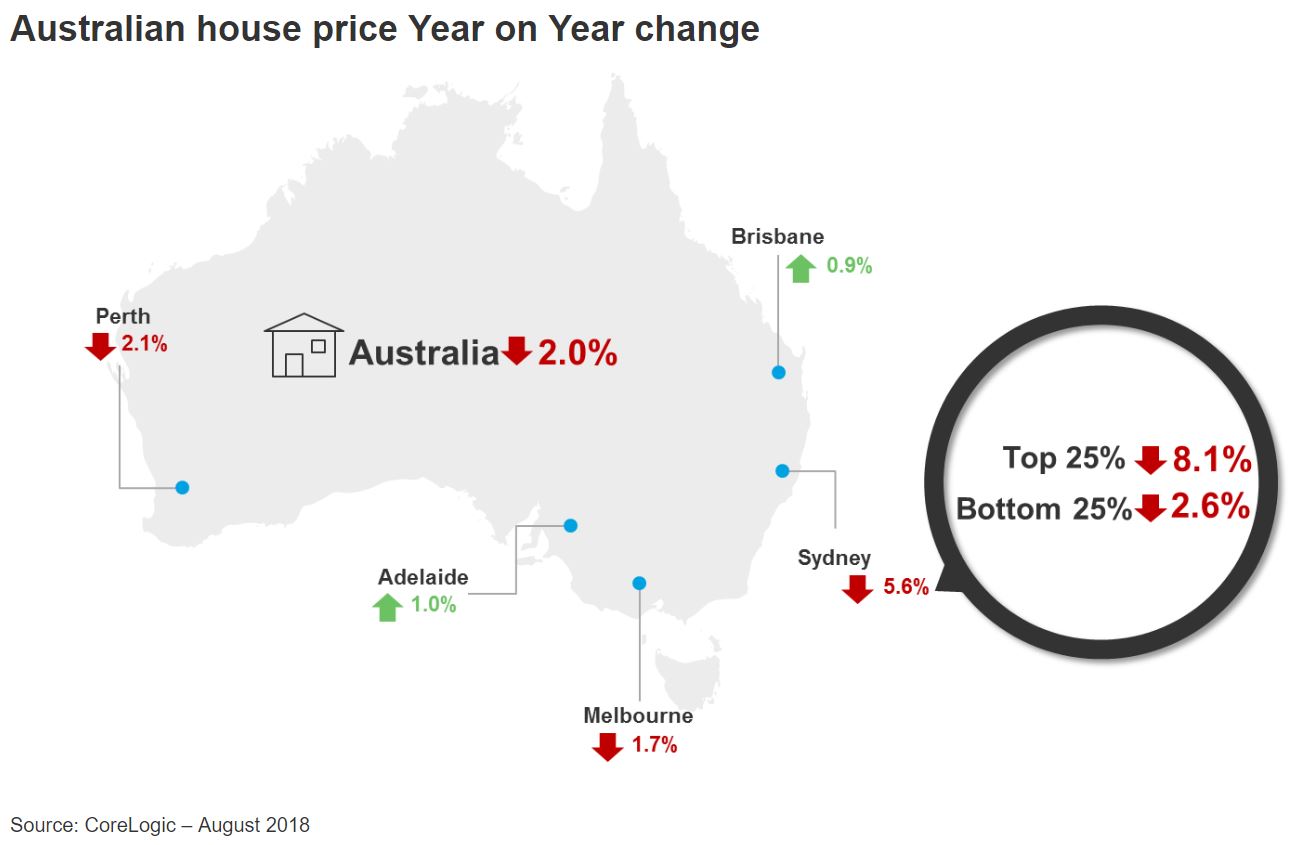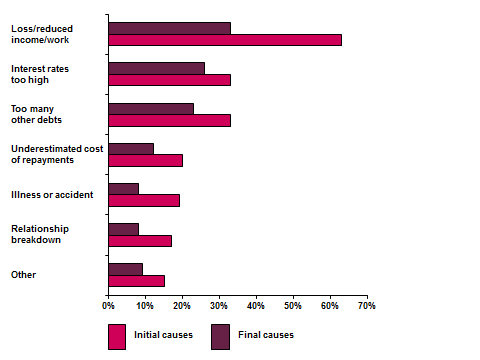
24 Sep Australian Mortgages – Should we be concerned?
There’s certainly been no shortage of headlines recently around the Australian housing market, mortgage lending, and supposed impending credit crunch.

While headlines can draw attention to important matters, they can also be sensationalised to capture the reader’s attention; distracting and creating confusion around what is really happening.
With this in mind, however, and after several years of positive momentum, is it now time to be worried about Australian mortgages?
What house price crash?
Anyone reading the news recently could be forgiven for believing that the housing market is in free fall.
While it’s true property prices have moderated from the highs posted last year, and the Royal Commission is also reducing the banks’ appetite for providing more marginal loans, at a national level house prices have declined by only -2.0% from last year according to CoreLogic data. This is far less than the -6.5% decline experienced in 2010/11.
In Sydney, the decline has been a more meaningful -5.6%, though this is not uniform across all properties. High priced properties have fallen more than low priced properties, with properties at the more affordable end of the spectrum attracting a wider range of buyers.

Keys to de-stressing a mortgage
“Don’t sail out farther than you can row back.” This Danish saying is sound advice for anyone thinking of borrowing to buy a home.
According to a paper1 for the Centre of Policy Development and University of Canberra, Australians have a tendency to be over-confident in our ability to repay loans. We also underestimate the likelihood of things potentially going wrong in our lives.
Have you ever heard yourself or someone else say “I’ll be able to repay my loan, provided I keep my job, don’t get sick and I’m not hit with any large unexpected bills”? Chances are you probably have. But things can and often do go wrong.
Causes of mortgage stress
A study2 was completed for the Royal Melbourne Institute of Technology (RMIT), which looked at the specific triggers that have resulted in Australian households being unable to meet their mortgage repayments. Survey respondents were asked the initial causes and, if they changed, what the final causes were. They were also able to identify more than one cause. The graph below shows the results.
 How to reduce mortgage stress
How to reduce mortgage stress
Like most things in life, it’s difficult to make borrowing a stress-free exercise, but there are a few things you might consider that may help to reduce the angst.
1. Build up a buffer
It’s a good idea to hold (or build up) a cash reserve in a mortgage offset account to provide a buffer that can be drawn upon to meet your loan repayments if you become ill or are off work for other reasons.
2. Take out personal insurances
It’s important to ensure your income (which is what services your debts) is not compromised due to certain events beyond your control. One way to do this is to ensure you have adequate personal insurances. Key examples include:
- Income Protection Insurance which can replace up to 75% of your income if you are unable to work due to illness or injury. This can ensure you are able to continue meeting the majority of your living expenses, not just your loan repayments.
- Critical Illness Insurance which can help you service or pay off your loan and meet a range of expenses in the event you suffer a specified illness, such as cancer or a heart attack.
- Total and Permanent Disability Insurance which can help you service or pay off your loan and provide an ongoing income if you become totally and permanently disabled.
- Life Insurance which can be used to service or pay off your loan and provide your family with an ongoing income if you pass away.
3. Take out mortgage protection insurance
Many lenders offer insurance when you take out a home loan that covers the mortgage (often up to a specified amount and for a particular period of time) if you die, become disabled or your employment ends involuntarily.
4. Fix the interest rate
Fixing the interest rate on your home loan can provide protection against rising interest rates. The downside is there are often restrictions on making additional payments into a fixed rate loan, which would limit your capacity to build up a buffer. Many people find a combination of fixed and variable rate loans works best, as additional repayments can be made into the variable rate portion of the debt.
5. Don’t add fuel to the fire
Over 40% of the people who completed the RMIT survey responded to the initial difficulty in meeting mortgage repayments by using credit cards more often than they normally would. Using debt to service debt is very likely to compound the problem.
6. Review your situation
At the first sign of a problem, it’s essential to seek advice, as there may be a range of potentially viable options to explore. Better still, you may want to seek advice before you decide how much to borrow.
How can we help?
We can help you assess your budget and cashflow situation and determine your affordability level. We can also determine your insurance needs and advise you on a range of other financial matters.
This article was prepared with the assistance from David Hanna from Macquarie Bank on 17 Sept 2018, the full article can be found by clicking here.
- Source: Understanding human behaviour in financial decision making: Some insights from behavioural economics. Paper to accompany presentation to No Interest Loans Scheme Conference “Dignity in a Downturn” June 2009. Ian McAuley, Centre for Policy Development and University of Canberra.
- Source: Mortgage default in Australia: nature, causes and social and economic Impacts. Authored by Mike Berry, Tony Dalton and Anitra Nelson for the Australian Housing and Urban Research Institute, RMIT Research Centre, March 2010.
If you would like to know more, talk to Michael Sik at FinPeak Advisers on 0404 446 766 or 02 8003 6865.
Important information and disclaimer
The information provided in this document is general information only and does not constitute personal advice. It has been prepared without taking into account any of your individual objectives, financial solutions or needs. Before acting on this information you should consider its appropriateness, having regard to your own objectives, financial situation and needs. You should read the relevant Product Disclosure Statements and seek personal advice from a qualified financial adviser. From time to time we may send you informative updates and details of the range of services we can provide. If you no longer want to receive this information please contact our office to opt out.
FinPeak Advisers ABN 20 412 206 738 is a Corporate Authorised Representative No. 1249766 of Aura Wealth Pty Ltd ABN 34 122 486 935 AFSL No. 458254


No Comments